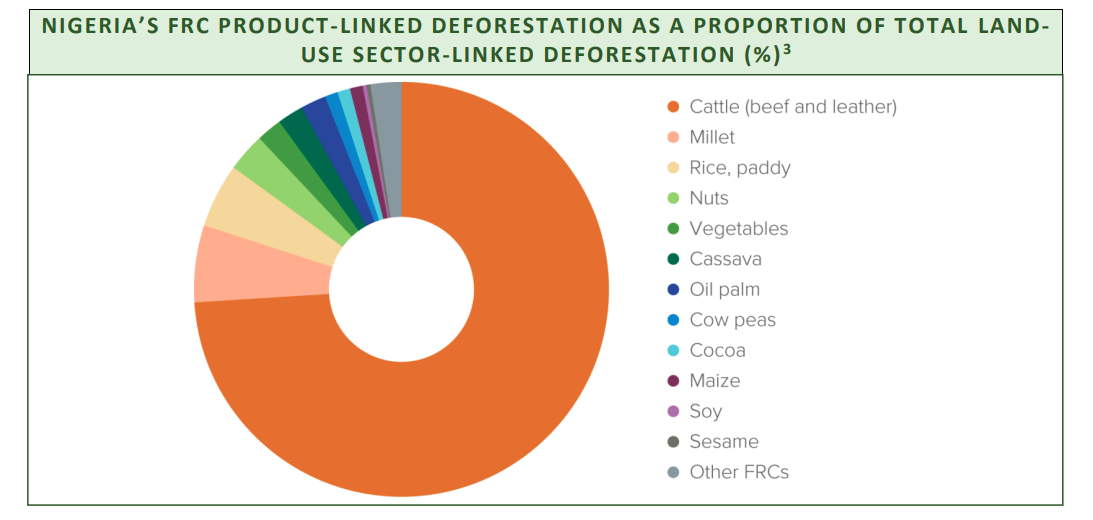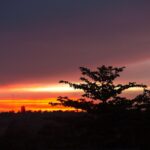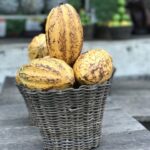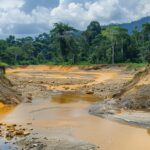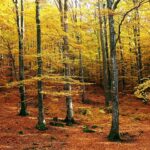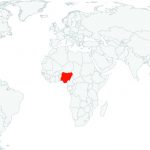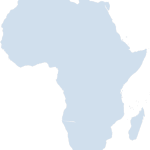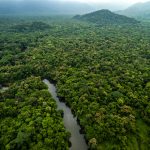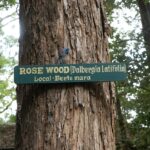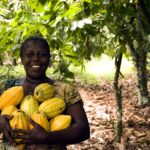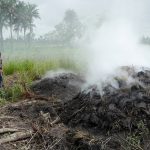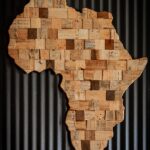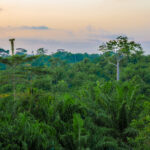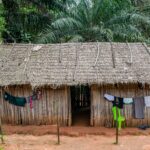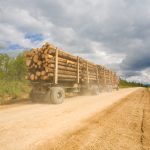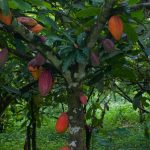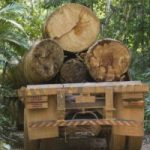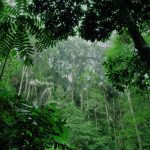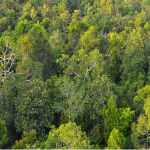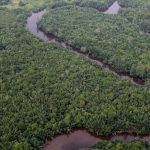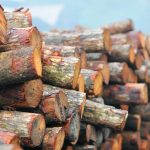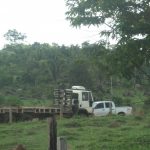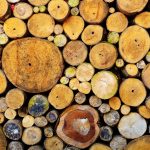Timber
Other Forest-Risk Commodities

FRC LEGALITY RISKS
Nigeria’s production of forest-risk commodities is likely to increase in the future – the population is projected to grow from 206 million in 2020 to 400 million by 2050. More than half will live in urban areas with higher temperatures and more extreme weather events due to climate change. Agriculture in Nigeria constitutes 21 percent of its GDP, 36 percent of its employment, and is dominated by smallholders who own 0.5 hectares (ha) of land on average, many of whom live in poverty. Under these economic and demographic pressures, the forest reserves are at high risk of further encroachment by farmers, herders, loggers, and poachers. Political instability and continued use of forests by armed groups could also drive further deforestation. Forest law enforcement lacks capacity and resources, and there remains a lack of effective coordination between control of the wildlife trade, illegal logging, and sustainable forest management.
- Nigeria’s forest area has decreased by 9% since 2000, including a 12% decrease in forest cover in protected areas, despite legal protections, highlighting the challenge of preventing illegal deforestation.
- Agricultural conversion is the main driver of forest loss in Nigeria due to production of beef, millet, rice, cassava, and vegetables, which are mostly sold/consumed domestically.
- Export-oriented cash crops, particularly wood products, cocoa, cashews, and sesame, are also associated with an elevated risk of illegal conversion.
- Policies governing forest conversion and agricultural production are set by Nigeria’s 36 states and are not always publicly available, making it challenging to determine the applicable laws country wide.
- Illegal conversion of forest for agriculture is not seen as a priority for law enforcement.
- There are reports of violence tied to land grabbing and conversion and widespread reports of commodity theft across Nigeria.
Read more by downloading the Nigeria Forest-Risk Commodity Dashboard here.
The article argues that Nigeria’s forestry sector could become a key pillar of economic diversification beyond oil, given the size of the global timber market and the country’s significant forest resources. However, the sector has declined sharply from its historical importance due to weak governance, underinvestment, and widespread illegal logging. Poor enforcement of forest laws, corruption, and inadequate monitoring systems have allowed illicit timber harvesting and cross-border trade to flourish, undermining both revenues and sustainable management. As a result, the government loses substantial income while legitimate operators struggle to compete in a distorted market. The piece concludes that without stronger enforcement, institutional reform, and modernization of forest management systems, Nigeria will struggle to fully realize forestry’s potential as a sustainable economic growth sector.
The Cross River State government has launched a traceability programme for cocoa, coffee and oil palm.
Traceability System is a structured digital framework designed to ensure end-to end visibility of agricultural commodities from farm to market. It involves farm mapping, geolocation of production areas, registration of farmers and value chain actors, and secure data management.
Launching the system, the State Commissioner for Agriculture and Irrigation Development, Hon. Johnson Ebokpo, said the government had commenced full implementation of the scheme and engaged PULA Advisors as Lead Consultant for the European Union Deforestation Regulation (EUDR) Compliance and Traceability Programme.
Malaysia has emerged as China’s fastest‑growing supplier of fibreboard, recording a remarkable 683% surge in shipments to 1,400 tonnes in the first nine months of 2025, according to new data from China Customs. The jump — the largest of any supplying country — comes as China’s total fibreboard imports rose 16% year‑on‑year to 45,000 tonnes – up to 50% of the world’s supply, signalling renewed demand from downstream manufacturers. New Zealand, Thailand, Germany, and Spain followed.
Vietnam remained China’s largest overseas market, with imports soaring 126% to 501,000 tonnes. Strong growth was also recorded in Saudi Arabia, Mexico, the United Arab Emirates, and Canada, each posting double‑digit increases. Exports to the United States and Nigeria softened, falling 9% and 1% respectively.
China’s wooden furniture sector, however, continues to face headwinds.
Export receipts fell 7% to US$16.69 billion in the first nine months of 2025, with shipments to the United States — China’s largest market — plunging 18% to US$4.24 billion. Despite the downturn, China maintained strong sales to other major destinations, exporting US$1.2 billion worth of wooden furniture to the United Kingdom and US$1.1 billion to Australia. Malaysia also remained a significant buyer, importing US$445 million worth of China‑made wooden furniture — an 18% increase year‑on‑year.
China’s wooden furniture imports also declined, falling 6% to US$461 million over the same period. Italy remained the largest supplier, accounting for 46% of China’s total imports, though shipments fell 9% to US$214 million. Declines were also recorded from Germany, Vietnam, and France. Whilst several smaller suppliers bucked the trend, with imports rising from Thailand, Slovakia, and Indonesia.
The Federal Government, through the Federal Ministry of Agriculture and Food Security, has launched a White Paper on Strategy for (EUDR) Compliance in Nigeria/ Signed a Memorandum of Understanding (MoU) on Establishing a National Framework for Agricultural Produce Traceability, Farmland Monitoring, and Deforestation–Free Supply Chain Verification.
Speaking on the launch, the Minister of Agriculture and Food Security, Sen. Abubakar Kyari, stated that the White Paper outlines Nigeria’s national strategy for compliance with the European Union Deforestation Regulation (EUDR).
Chinese demand for tropical timber, particularly rosewood, has driven a massive wave of illegal logging across West Africa over the past decade. From 2012 to 2019, Ghana exported roughly 540,000 metric tons of rosewood to China — the equivalent of six million trees and approximately 2,000 acres of forest loss. This occurred despite multiple national export bans and international restrictions under CITES.
Between 2017 and 2022, rosewood exports from West Africa to China were estimated to exceed US $2 billion. Although rosewood is the most prominent species, the demand extends to other high-value hardwoods, contributing to widespread illegal logging and accelerating deforestation across the Sahel and coastal forests.
Illegal logging now accounts for the majority of timber harvested in several West African countries. It is estimated that 70 percent of logging in Ghana, 65 percent in Cameroon, and 56 percent in Nigeria occurs outside the legal framework. These activities are often enabled by weak enforcement, corruption, and the complicity of local traders who act as intermediaries for Chinese buyers.
In Nigeria, annual government revenue losses from illegal logging are estimated between US $191 million and US $383 million. Cameroon loses between US $51 million and US $103 million each year, while Côte d’Ivoire forfeits roughly US $38 million to US $76 million. These figures represent lost taxes, royalties, and fees that could otherwise support local communities and forest protection.
In Mali, for example, despite a 2020 ban on rosewood exports, nearly 150,000 tons—equivalent to roughly 220,000 trees—were still shipped to China in subsequent years. Such cases illustrate the scale of smuggling networks operating with impunity across porous borders. In Cameroon, Chinese-backed agribusinesses have cleared over 10,000 hectares of forest since 2011 for rubber plantations, contributing to an estimated 45,000 hectares of total deforestation linked to Chinese commercial interests. This land conversion often overlaps with community forests or protected areas.
The Nigerian government, in partnership with cocoa sector stakeholders, convened the Nigeria–EU Cocoa Roundtable in Abuja to accelerate compliance with the EU Deforestation Regulation (EUDR) before its December 2025 deadline. Officials, including the Minister of Industry, Trade and Investment and the Senior Special Assistant to the President on Agribusiness, emphasized that compliance is essential to protect over 60% of Nigeria’s cocoa exports, strengthen sustainability, and support over 300,000 smallholder farmers. Cocoa exports surged 606% in Q4 2024—from ₦171 billion to ₦1.2 trillion—making up roughly 29% of agricultural exports, and the government aims to boost production from 320,000 to 500,000 tonnes by 2025 through targeted interventions, financing solutions, and investment in local processing, traceability systems, and climate-smart practices.
The Banyinyi Boki Women’s Association has emerged not merely as nature’s protectors, but as architects of an alternative future. Rooted in a tradition where community and sustainability converge, the Boki women wove their resistance into something enduring. In 1959, the Banyinyi Women’s Association, a pan-sociocultural institution with the mandate to preserve Boki culture, was formed to encourage Boki women’s sociocultural role in community development and the promotion of inter-village/clan cooperation. Over time, its responsibilities have widened, and today, the women’s association also plays a vital role in combating deforestation in the Boki rainforest.
Nigeria has seen its highest agricultural trade value surged by 304 percent in 2024, the highest in five years.In the last five years (2020 – 2024), agric trade jumped to N8.2 trillion in 2024 from N2 trillion in 2020 on volatile naira and diversification drive, according to data from the foreign trade report. In 2024, according to the National Bureau of Statistics (NBS), agriculture recorded a trade surplus, with exports surpassing imports by 17 percent for the period. Marking the first time export surpassed import trade since 2020.
Durum wheat remained a major import commodity for Nigeria. Countries such as the United States, Asia, Japan, Turkey, and Germany were some of Nigeria’s core trade partners. For exports, cocoa, sesamum, cashew, ginger and frozen shrimps, among others topped the charts for agric commodities in 2024 as has been the case in the last five years, further stamping their global demand.
In spite of efforts of governments at various levels to diversify the economy, earn foreign exchange and create jobs, reports on illegal mining of solid minerals across many states of the federation have continued. Data from the Ministry of Solid Minerals and Development show that illegal mining activities have continued to thrive.
Upon assumption of office as Governor, Hyacinth Alia announced the suspension of all forms of illegal logging and mining activities with a warning that it was against the law and anyone caught in any of the activities would face the full wrath of the law.
An alarm has been raised on Bauchi State government’s sanctioned deforestation described as having far-reaching consequences for the environment, biodiversity, and future generations; this is according to the Nigeria Environmental Action Group (NEAG). The group said illegal logging and unauthorized land clearing in Bauchi State require much more attention from the State Governor.
Other issues bedevilling the state have been accusations of land grabbing by government-sanctioned land grabbers chasing out local herding communities. These have impacted herders and their grazing routes, affecting hundreds of thousands of cattle.
As a top-five global cocoa producer, Nigeria exports over 60% of its cocoa to the EU. The sector supports more than five million people across farming communities and contributes significantly to non-oil foreign exchange earnings. Non-compliance with the EUDR would put these livelihoods and revenues at risk.
Other countries in the region, particularly Ghana and Côte d’Ivoire, are already advancing their traceability systems. If Nigeria lags behind, its cocoa could become less attractive to international buyers.
Despite Nigeria’s agricultural potential, several structural and operational hurdles stand in the way of EUDR compliance:
• Limited Farm Mapping: Most smallholder farms are not GPS-mapped and lack formal land titles or digital records
• High Costs: The tools required for geolocation, certification, and audits are financially out of reach for many farmers
• Low Awareness: Many cocoa farmers are still unaware of the regulations and how they impact their future in global trade
• Policy Gaps: Nigeria’s legal and institutional frameworks are not yet fully aligned with international sustainability standards.
Despite the challenges, a growing number of stakeholders in Nigeria’s cocoa value chain are beginning to respond proactively:
• Farm Mapping Initiatives: Cooperatives and tech startups are rolling out GPS-based farm mapping solutions
• Sustainable Farming Practices: Training programs are teaching farmers methods like agroforestry and shade-grown cocoa to meet environmental standards
• Blockchain Pilots: Some regions are testing blockchain systems to build transparent, traceable supply chains from farm to export
• Certifications: More farmers are securing international certifications like Rainforest Alliance and Fairtrade
• Government Task Force: A National Task Force has been set up to coordinate compliance efforts, data collection, and financing strategies.
North America is the major beneficiary of the EU’s Green New Deal, with huge shipments of imported lumber to replace European-sawn wood and panels that will be limited under the LULUCF Regulation.
Citizens Against Crime and Corruption (CACC), an environmental conservation group, has raised concerns about the increasing rate of illegal logging in Cross River State, resulting in billions of US dollars loss to the Nigerian economy.
The group also calls for international organizations to halt funding for the preservation of Nigeria’s flora and fauna, alleging that the funds are being misused or diverted for purposes other than conservation. Also reported here: Outrage over illegal logging in Cross River
A ZAM transnational investigation conducted across six African countries has revealed the complicity of governing political elites in rapid deforestation. At the same time, many of these elites are receiving billions of dollars and euros in ‘green’ funds from international partners, including the UN, the EU, and the World Bank. Previous instalments of this investigation, already published by ZAM, have highlighted this pattern in Uganda, Nigeria, and Mozambique. The latest findings from Cameroon, Ghana, and Malawi are in line with the earlier results.
The Team Europe Initiative (TEI) supports capacity building and provides technical support on traceability
systems, geolocalisation and legality to partner countries, through a specialized Technical Facility and
programmes such as SAFE and AL-INVEST Verde. TEI programmes are active in Brazil, Colombia, Democratic
Republic of the Congo, Ecuador, Ethiopia, Indonesia, Kenya, Nigeria, Peru, Tanzania and Zambia. Burundi will
soon join the SAFE programme.
A Professor of Forest Engineering, Ayodeji Omole, of the dangers to Nigerian forest operations due to attacks, killings, raping, and kidnapping for ransom by armed men. Forests in the South-East and South-South are affected. Since 2013 Boko Haram insurgents have found a safe haven in the Sambisa Forest.
The security issues affect the planning and implementation of forestry operations because farmers have lost their lives to the sporadic shootings of insurgents, bandits or unknown-gun-men in many parts of Nigeria: on their farms, highways and villages.
Nigeria has become a major transit hub for trafficking illicit wildlife products, including pangolin scales, ivory, and other protected species from Eastern and Central Africa. These products enter the country through porous land borders and exploit Nigeria’s advanced sea and airport infrastructure. To combat these challenges, the Government of Nigeria requested support from the International Consortium on Combating Wildlife Crime (ICCWC) in 2019 to implement the Wildlife and Forest Crime Analytic Toolkit and the ICCWC Indicator Framework for Combating Wildlife and Forest Crime.
The United Nations Office on Drugs and Crime (UNODC) has finalized the findings of the ICCWC Toolkit Assessment for Nigeria. The report outlines 33 recommendations to strengthen Nigeria’s wildlife criminal justice system. The Federal Government, through its Ministry of Environment, has endorsed the ICCWC Toolkit report, and UNODC will support the implementation of its recommendations.
In many states, including Kogi, Ekiti, Ondo, Ogun, Taraba, Kaduna, Adamawa, and Cross River, a rapacious demand by China for an ornate species of wood, rose wood (Pterocarpus erinaceus) locally known as Kosso, has since late 2013 fuelled an unprecedented frenzy of illegal logging of wood that is fast depleting the nation’s natural forestry resources.
In her 2018 study titled Eco-criticism: A comparative Study of Madrid Deforestation and its Effect on Secondary School Students’ Learning Performance in Jalingo and Ardo Kola Local Government Taraba State of Nigeria, Dr. Abigail Seth Karfe of the Taraba State University found students were “immensely involved in Madrid (rosewood) deforestation and this has a lot of negative influence and effect on their learning.” performance
A team led by Tanzanian remote-sensing scientist Robert Masolele used high-resolution satellite data and deep-learning techniques to draw up a map identifying the drivers of forest conversion in Africa.
The research shows that most deforested land on the continent is turned into small-scale farms, with the Democratic Republic of Congo and Madagascar being hotspots for this pattern of forest loss.
With better remote-sensing data, researchers can pinpoint where agriculture is eating into forested areas and where cash crops are replacing woodland. In this work, the group focused on commodity crops like cacao, oil palm, rubber and coffee, which are targeted under the European Union’s recently enacted rules to restrict import of crops linked to deforestation.
UNODC’s country representatives says two thirds of all seizures involving Nigeria were reported by the authorities of other countries. Nigeria is a key transit hub and consolidation point for various forms of illegal trade in wildlife and forest products, especially for pangolin, ivory and rosewood. These products are sourced both from Nigeria as well as from other countries in the region including Cameroon, Gabon, the Central African Republic, the Democratic Republic of Congo, Liberia, Cote d’Ivoire and Benin Republic.
According to UNODC’s World Wildlife Seizures Database, he said there were more than a 1000 records between 2011 and 2020 which indicate Nigeria as a source, transit or destination country. Another finding of the research suggests that armed groups are increasingly involved in the illegal harvesting and trafficking of rosewood. Illegal logging activities continue, despite the 2018 trade suspension of rosewood from Nigeria.
UNODC’s 2024 World Wildlife Crime Report has a case study on the illegal trade in rosewood, with a focus on Nigeria. Major players in the case study include China, India, Singapore, Mali, Guinea-Bissau, Brazil, Vietnam and Ghana.
Amid hundreds of millions paid by donors to the Ugandan government for forest-saving projects, a powerful logging syndicate linked to the same government continues the desertification. In Nigeria, also despite much “green” funding, the government itself clears out the trees. Forest communities are impoverished in the process.
Six years after the ban on illegal timber export, Nigerian wood processing sector has picked up with the creation of five million jobs in the value chain and is expected to earn more than N650 billion ($500 million). Before the ban, more than 14,000 containers laden with wood were smuggled by Chinese through Nigerian ports annually.
Local communities claim that Chinese operators have been unable to provide information about their permits and/or concession agreements allegedly issued to them by the Forestry Commission authorising the logging of such immature trees, and authorities are not doing enough to enforce the law.
The UN has decried illegal trade in wildlife and forest products in Nigeria with little effective prosecution. The 2023 UNODC Organized Crime Threat Assessment for Nigeria revealed that Nigeria is a key transit hub and consolidation point for various forms of illegal trade in wildlife and forest products (including rosewood). These products are sourced both from Nigeria as well as other countries in the region including Cameroon, Gabon, the Central African Republic, the Democratic Republic of Congo, Liberia, Cote d’Ivoire and Benin Republic.
Other related news cites more than 1000 records between 2011 and 2020 indicating that Nigeria is a source, transit, or destination country, or that the offender was a Nigerian national. Nigeria deals on illegal wildlife, forest products – Blueprint Newspapers Limited
In spite of efforts of governments at various levels to diversify the economy, earn foreign exchange and create jobs, reports of illegal mining of solid minerals across many states of the federation are very disturbing. Data from the Ministry of Solid Minerals and Development show that illegal mining activities have continued to thrive in spite of government’s repeated threat to prosecute culprits.
Kwara State Government intensifies efforts to combat deforestation by cracking down on illegal charcoal production. The crackdown on illegal charcoal dealing poses significant challenges, given the lucrative nature of the trade and its deep roots in certain local communities.
The first high-resolution (5 m) and continental-scale
mapping of land use following deforestation in Africa, including humid and dry forests.
Results show, not surprisingly, that the causes of forest loss vary by region. In general, small-scale cropland is the
dominant driver of forest loss in Africa, with hotspots in Madagascar and DRC. In addition, commodity
crops such as cacao, oil palm, and rubber are the dominant drivers of forest loss in the humid forests of
western and central Africa, forming an “arc of commodity crops” in that region. At the same time, the
hotspots for cashew are found to increasingly dominate in the dry forests of both western and southeastern Africa, while larger hotspots for large-scale croplands were found in Nigeria and Zambia.
CONSERVATIONISTS, Civil Society Organisations, youth leaders and community elders, at the weekend, raised the alarm over the presence of Chinese in Effi community in the Cross River Reserved Forest area for undisclosed business.
Giving the warning on the platform of Coalition Against Illegal Logging and Mining in Cross River, CALAMA CRS, the stakeholders said after an intensive round table meeting in Calabar to x-ray the situation it became imperative to let the public know of what was going on.
In a circular with reference numbers T&T/2023/CIRCULAR NO.8, dated 8th of June 2023 and signed by Assistant Comptroller General of Customs, Musa MBA for the Comptroller General, the service confirmed that the administrative ban placed on the export of processed wood, charcoal and other allied products is lifted with immediate effect.
The circular reads in part “I am directed to forward herewith copy of the Federal Ministry of Finance letter Ref: No.F.17545/T/9 dated 5” Jun 23 on the above subject matter.
“The letter which is self-explanatory confirms that the administrative ban placed on the export of processed wood, charcoal and other allied products is hereby lifted with immediate effect.
“However, threatened plants classified as endangered species (CITES listed), including Rosewood (Pterocarpus erinaremainremains prohibited from being exported.
“Consequent upon the foregoing, all requests for the Exportation of Processed Wood, Charcoal and other Allied Products, must be supported with a letter of approval obtained from the Federal Ministry of Finance, Budget and National Planning.
Environmental and ecology group, We The People, has charged the governor-elect of Cross River State, Senator Prince Bassey Otu, to take the issue of deforestation seriously, urging him to read the riot act to encroachers of the state’s forest reserves.
The Commissioner for Forestry, Ogun State, Mr Taiwo Oludotun, has warned village heads in the government-owned forest reserves not to indulge in unwholesome practices that may disrupt activities in the forests. He listed some of the unwholesome activities to include illegal felling of trees, destruction of trees for plantation of crops like cocoa, cola nut and illegal collection of flitches, noting that the unwholesome acts would no longer be allowed.
Members of the forest community in Akamkpa local government area of Cross River have called on the state government to check the high level of timber exploitation alleged to be carried out by one Ezemac International Nigeria Limited.
Officials of the Edo State Public Works Volunteers (PUWOV) have apprehended a suspected syndicate of illegal wood loggers who were allegedly caught felling and transporting trees at the forest reserve in Imoga Community, Akoko-Edo Local Government Area of Edo State.
A key report just launched by the Food and Agriculture Organisation (FAO), an agency of the United Nations is showing that rainforests, including those of the Niger Delta, the polluted oil and gas basin of Nigeria, are fast disappearing.
The Okomu National Park located in Ovia South West Local Government Area of Edo State was established in 1935 and is one of the seven parks in the country that is facing challenges. Among the challenges faced by the parks, it was gathered are conversion of the forest to plantation by cocoa farmers, illegal lumbering of trees by loggers and hunting of animals, among others.
A Non-Governmental Organization, Rainforest Resource, and Developmental Center, RRDC, has asked the Cross River State Government to furnish it with a detailed report of a fallen trailer in Ikom, laden with suspected illegal timber.
The United Nations (UN) has declared that Nigerian wildlife and forests are under severe threat with vast amounts of rare tropical woods being illegally extracted and smuggled out of the country. The UN also disclosed that the country has over the past decade evolved into a primary transit hub for the trafficking of wildlife products, including ivory, pangolin scales and other protected species.
Insight has been thrown into the cause of the protracted battle that now rages in Inikirogha community in Ovia South West L.G.A. in Edo State following an interview granted by the Western Zone scribe of the Ijaw Youth Congress (IYC) Mr Olu Derimo, and published in an online media blog, www.congressng. com on the 28th March 2022. The youth leader attributed the attack on the community to a supremacy battle between Governor Obaseki’s SSA, Mr Godstime Ogidigba, and Mr. Robert Okubo over who controls the illegal logging business in the Okomu Forest Reserve and Okomu National Park.
Akure-Ofosu Forest Reserve was established to help protect what is now one of largest remaining tracts of rainforest in Nigeria, and is home to many species. But fire and logging is rampant in the reserve, with satellite data showing it lost 44% of its primary forest cover in just two decades; preliminary data indicate deforestation may be increasing further in 2022.
Cross River State Governor, Prof. Ben Ayade, yesterday vowed that his government would fight illegal wood loggers in the state, whose nefarious activities have led to depletion of the state’s forest reserve. Addressing newsmen in his office in Calabar, the governor threatened to use any political appointee and security agents aiding and abetting illegal logging as scapegoats.
Afi River Forest Reserve (ARFR), in eastern Nigeria’s Cross River state, is an important habitat corridor that connects imperiled populations of critically endangered Cross River gorillas. But deforestation has been rising both in ARFR and elsewhere in Cross River; satellite data show 2020 was the biggest year for forest loss both in the state and in the reserve since around the turn of the century – and preliminary data for 2021 suggest this year is on track to exceed even 2020.
The New and Old Ekuri community of the Cross River state in Nigeria are resisting the illegal logging of their forest to pave way for a proposed highway. The ICCA Consortium stands with the Ekuri community and calls for the immediate end of the illegal logging and violation of the community’s rights, including free, prior and informed consent, and continuous undermining of their longstanding efforts to conserve their forest
In recent times, Nigeria’s forests have decreased steadily due to indiscriminate felling by illegal loggers. Damilola Ayeni travelled to Ekiti, one of the most forested states in Nigeria, to uncover the crime going on under the shade of trees.
Click here to access the Global Illegal Logging and Associated Trade (ILAT) Risk assessment tool and to download the Forest Trends User Guide describing the functionality of the ILAT Risk Data Tool.
Click here to access the Cattle Data Tool.

